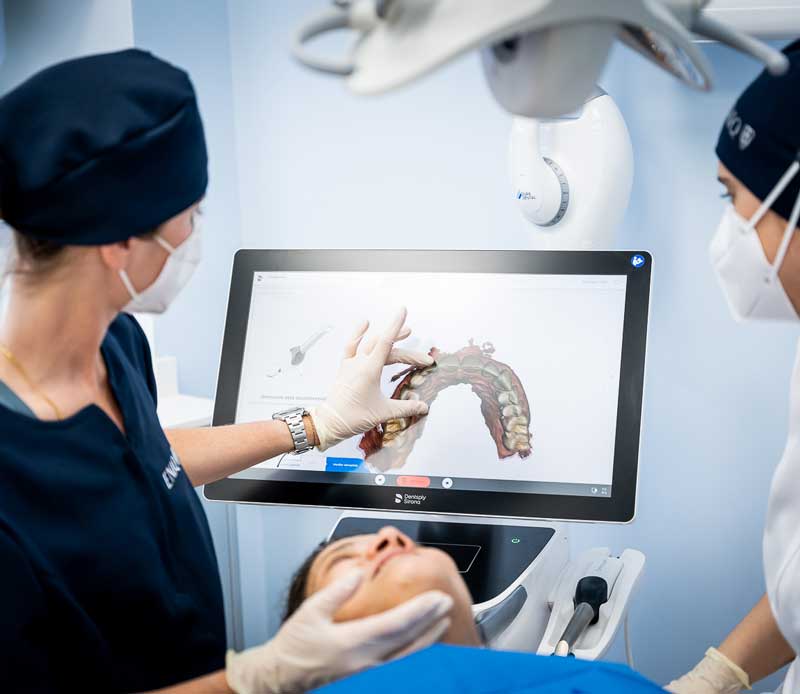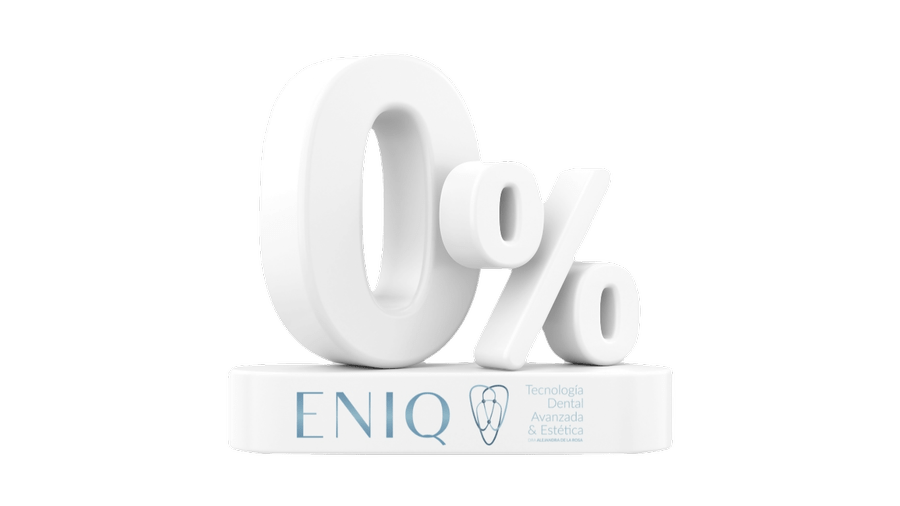

Dental Crown
High-quality dental crowns to restore and beautify your smile.
What are dental crowns or dental caps?
When a tooth is severely weakened due to extensive decay, this type of protection is used to preserve the tooth and prevent it from breaking while chewing.
Dental crowns can be made from various materials:
- Metal with porcelain: Offers strength and specific aesthetics.
- Ceramic: Known for their natural appearance.
- Zirconium: Provides great durability and aesthetics.
- Lithium disilicate: They are resistant and aesthetically pleasing.
Every day, there is more evolution in this field thanks to 3D dentistry, leading to the development of new and better materials that are more compatible with natural teeth. This ensures that the crowns are durable and aesthetically pleasing, and they resist damage while chewing.
Say goodbye to the old concepts of root canals/pins/crowns, which are often used by professionals working with cheap standards to inflate budgets.
At ENIQ, we are pioneers in 3D restorative dentistry in Spain. We were one of the first four clinics in Spain, 15 years ago, to consider making crowns differently—more aesthetic and less aggressive both in terms of preparation and the impact on adjacent teeth. We have been internationally recognized for this innovation in 2021 and 2022.
We propose more conservative designs for dental structures and more biocompatible materials. Our approach breaks paradigms for the benefit of patients and their teeth.
Our tooth preparations are as conservative as possible to preserve the dental structure to the maximum. We elevate the vertical dimension without any preparation, pins, or crowns. We always add, never subtract dental structure, in line with the principles of biomimetic dentistry.
What are the advantages and how long do dental crowns last?
Providing a specific lifespan for a dental crown would be misleading, as it depends on several factors, including:
- Good hygiene: Maintaining proper oral hygiene practices.
- Number of missing teeth in the mouth: This can affect the distribution of chewing forces.
- Dietary habits: Diets that promote dental health can extend the lifespan of crowns.
- Habits like teeth grinding: Known as bruxism, it can accelerate crown wear and tear.
- Occlusal trauma: Misalignments or improper bites can influence durability.
In cases where the patient maintains proper hygiene, has all their natural teeth, and habits like teeth grinding are managed, meaning the patient is under control, dental crowns or caps could last 10 years or more.
Duration
How long does it take to place a crown on an implant?
At ENIQ, you'll have your dental crown or cap on the same day, thanks to our technology. For the past 15 years, we have been using 3D technology to capture measurements instantly through photography instead of using uncomfortable silicones and alginates. We have received international awards for our digital workflow in dentistry in 2021 and 2022.

What are the advantages and how long do dental crowns or caps last?
Providing a specific lifespan for a dental crown would be misleading, as it depends on several factors, including:
- Good hygiene.
- Number of missing teeth in the mouth.
- Dietary habits.
- Habits like teeth grinding.
- Occlusal trauma.
In cases where the patient maintains proper hygiene, has all their natural teeth, and habits like teeth grinding are managed, meaning the patient is under control, dental crowns or caps could last 10 years or more.

What is our opinion on dental crowns or caps?
At ENIQ, we differentiate ourselves by being very conservative. While many might suggest a root canal, post, and crown, possibly due to their low pricing or fee schedules, we prefer not to deceive the patient and opt for a dental inlay.
Correctly diagnosed dental crowns can be an excellent dental treatment, but one should be cautious. Sometimes, unnecessary root canals, posts, and crowns are performed solely for profit.
Always ensure that the materials used are not too hard (such as zirconium) and won't damage the tooth during chewing with the crown.
Always verify that the damage to your tooth justifies the placement of a crown (usually more than one dental cusp destroyed).
Dra. Alejandra de la Rosa
Medical Director
What is the price of dental crowns or caps in Madrid?
To determine the price of a dental crown, several factors need to be considered. Firstly, the type of crown or material to be used. A porcelain or ceramic crown is not the same as a resin or zirconium crown. Each has its own advantages and price differences.
The average price of a porcelain dental crown in Madrid is around €350, while a zirconium crown could be around or above €400.
There are also provisional dental crowns that are used while the final crown is being made.

- Financing: Up to 24 months without interest. Up to 60 months with preferential conditions.
- Payment installment: Pay for the treatment in convenient monthly installments.
- Early payment discount: Pay for the entire treatment upfront and receive a discount.
- Multiple payment options: Direct debit, credit card, cash, bank transfer, Apple Pay, Google Pay, and Bizum.
Hybrid Prosthesis on Implants
Complete Solution
*subject to specialist assessment
The cost of a dental crown varies based on the material used, with porcelain crowns priced at €350 and zirconium crowns costing over €400. Provisional crowns are also an option.
-
All-inclusive
-
Interest-free financing
Frequently Asked Questions
Do you have more questions about dental crowns or caps?
Generally, dental crowns do not usually cause problems, but if they do, some of the most common ones are:
- Dental sensitivity: After placing a dental crown, you may experience sensitivity in the treated tooth. This can be due to the crown not fitting perfectly, allowing the entry of food and bacteria, or because the procedure has affected the tooth's nerves.
- Loose or detached crowns: In some cases, crowns can become loose or detach due to a lack of dental cement or poor adhesion. This can occur especially if the crown is not placed correctly or if there are problems with the underlying tooth structure.
- Lack of proper fit: If the crown does not fit properly to the prepared tooth, it can cause discomfort, interfere with the bite, or allow the entry of bacteria and food between the crown and the natural tooth.
- Discoloration or color changes: Dental crowns can discolor over time due to exposure to certain foods, drinks, tobacco, or other factors. This can result in an uneven or unsightly appearance.
- Gum complications: If the crown is not placed correctly in relation to the gum line, it can cause irritation, inflammation, or even gum infection. This may require additional adjustments or even the removal and replacement of the crown.
- Problems with the underlying tooth structure: In some cases, the crown can exacerbate pre-existing problems with the tooth's structure, such as decay or fractures. If these issues are not properly treated before placing the crown, additional complications may arise.
- Wear of the crown: Over time, dental crowns can experience wear due to normal use, which may require repairs or periodic replacements to maintain their functionality and appearance.
It is crucial to follow the dental care recommendations provided by your dentist to minimize these problems and ensure the durability and long-term success of your dental crowns.
The choice of material for a dental crown depends on various factors, such as the location of the tooth in the mouth, the tooth's function, the desired aesthetics, and the patient's preferences. Below are some of the most common materials used for dental crowns, along with their characteristics:
- Porcelain (ceramic):
- Aesthetics: Porcelain crowns are highly aesthetic and can be customized to match the color and shape of natural teeth perfectly.
- Durability: They are quite durable and resistant to wear.
- Biocompatibility: Porcelain is biocompatible and does not irritate the gums or cause allergic reactions.
- Dental wear: They are less abrasive to opposing teeth than some other materials.
- Porcelain fused to metal (PFM):
- Strength: PFM crowns combine the aesthetics of porcelain with the strength of metal.
- Durability: They are more resistant to fracture than pure porcelain crowns.
- Aesthetics: Although they have a porcelain layer, the gum line may show a small metal line, which can affect aesthetics compared to pure porcelain crowns.
- Metal (gold, noble metal alloys):
- Resistance: Metal crowns are highly resistant to fracture and wear.
- Conservation of dental tissue: They require less removal of the natural tooth during the preparation process.
- Aesthetics: Although very durable, metal crowns are not aesthetically appealing and are generally used on back teeth where appearance is not as critical.
- Zirconia:
- Aesthetics: Zirconia crowns offer an aesthetic similar to porcelain, with the additional advantage of being highly translucent and aesthetically pleasing.
- Durability: They are highly resistant to fracture and wear.
- Biocompatibility: Zirconium is biocompatible and does not irritate oral tissues.
- Weight: They are lighter than metal crowns.
The best material choice for a dental crown will vary according to the individual needs and preferences of the patient, as well as the dentist's recommendation based on the location of the tooth and other specific case considerations. It's important to discuss these options with a dental professional to determine the best solution for your situation.
